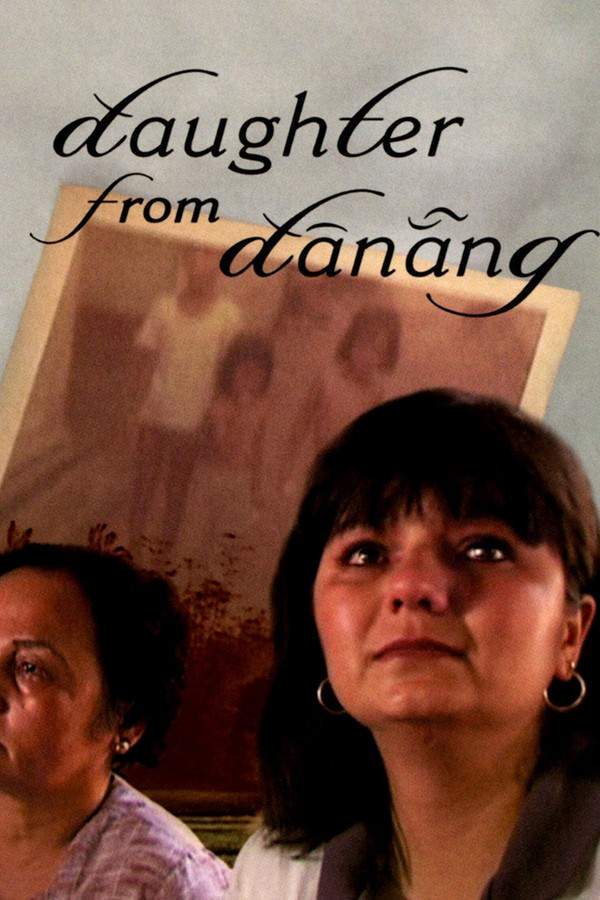Daughter from Danang 2002

Following the Vietnam War, a deeply moving story follows Heidi "Mai" Bub, an Amerasian girl, as she reunites with her Vietnamese mother, Mai Thi Kim. Separated during the conflict in 1975, their long-awaited reconnection 22 years later explores themes of identity, cultural heritage, and the unwavering bond of a mother's love. The film portrays a poignant journey of rediscovery and understanding across generations and continents.
Does Daughter from Danang have end credit scenes?
No!
Daughter from Danang does not have end credit scenes. You can leave when the credits roll.
Meet the Full Cast and Actors of Daughter from Danang
Explore the complete cast of Daughter from Danang, including both lead and supporting actors. Learn who plays each character, discover their past roles and achievements, and find out what makes this ensemble cast stand out in the world of film and television.
No actors found
External Links and Streaming Options
Discover where to watch Daughter from Danang online, including streaming platforms, rental options, and official sources. Compare reviews, ratings, and in-depth movie information across sites like IMDb, TMDb, Wikipedia or Rotten Tomatoes.
Ratings and Reviews for Daughter from Danang
See how Daughter from Danang is rated across major platforms like IMDb, Metacritic, and TMDb. Compare audience scores and critic reviews to understand where Daughter from Danang stands among top-rated movies in its genre.

77
Metascore
6.2
User Score

7.5 /10
IMDb Rating

68
%
User Score
Take the Ultimate Daughter from Danang Movie Quiz
Challenge your knowledge of Daughter from Danang with this fun and interactive movie quiz. Test yourself on key plot points, iconic characters, hidden details, and memorable moments to see how well you really know the film.
Daughter from Danang Quiz: Test your knowledge on the emotional journey of Heidi Neville Bub in Daughter from Danang.
What was Heidi's birth name?
Mai Thi Hiep
Heidi Neville Bub
Mai Thi Kim
Tran Tuong Nhu
Show hint
Awards & Nominations for Daughter from Danang
Discover all the awards and nominations received by Daughter from Danang, from Oscars to film festival honors. Learn how Daughter from Danang and its cast and crew have been recognized by critics and the industry alike.
75th Academy Awards 2003
Documentary (Feature)
Full Plot Summary and Ending Explained for Daughter from Danang
Read the complete plot summary of Daughter from Danang, including all major events, twists, and the full ending explained in detail. Explore key characters, themes, hidden meanings, and everything you need to understand the story from beginning to end.
Heidi Neville Bub, originally born as Mai Thi Hiep on December 10, 1968, in Da Nang, had a challenging start in life. Her mother, Mai Thi Kim, already a mother of three, was abandoned by her husband Do Huu Vinh, who left to fight with the Viet Cong. While working at an American military base, Kim encountered Heidi’s father, an American serviceman. As the North Vietnamese army advanced towards Da Nang, fear gripped Mai Thi Kim for her daughter’s safety due to rising fears of violence against mixed-race children. At just six years old, Heidi was sent to the United States and placed in an orphanage managed by the Holt Adoption Agency.
Soon after, Heidi was adopted by Ann Neville, a devoutly religious single woman who rebranded her as Heidi. They lived in Columbia, South Carolina, for a year before eventually settling in Pulaski, Tennessee. Ann told Heidi a fabricated story about her origins, insisting that her parents had been killed in the war and instructing her to omit any mention of her true background. Heidi was raised under strict rules, forbidding her from dating and discouraging friendships. After her freshman year of college, Heidi faced a shocking rejection; Ann Neville had packed her belongings outside and proclaimed that Heidi was no longer her daughter, leading to a lasting estrangement between them.
Now married and a mother of two young daughters, the scars from her past remain raw. In a quest for closure, Heidi reaches out to the Holt Adoption Agency and discovers a letter from her biological mother, Mai Thi Kim, sent in 1991, expressing her wish to reunite with Heidi. This information had been ignored by Ann Neville, leaving Heidi unaware of her mother’s attempts to connect. Fueled by this revelation, Heidi, assisted by journalist Tran Tuong Nhu, embarks on a journey back to Vietnam to meet Mai Thi.
Upon their emotional reunion, filled with joy and tears, Heidi quickly faces the disorienting challenges of culture shock. Having grown up disconnected from her Vietnamese roots, she struggles with the customs, food, language, and overwhelming familial affection she encounters. Mai Thi’s expectation to be close to her daughter, even sharing a bed, feels suffocating to Heidi who was raised in an emotionally distant environment. Navigating through bustling markets proves exhausting, and Heidi soon learns the harsh realities of her family’s impoverished life, where focus is on caring for Mai Thi.
Heidi’s half-brother steps in as the family patriarch, directly informing Heidi that it is her turn to provide support for their mother. Mai Thi expresses her desire to live in America, a request that takes Heidi by surprise. Frustrated and feeling obligated, she responds that relocating Mai Thi is not a viable option. The tension escalates when her half-brother advises her that, if she can’t take Mai Thi with her, she should financially support them from afar. Crestfallen, Heidi leaves their home, overwhelmed by a torrent of emotions. Caught between cultural misunderstandings, her Vietnamese family fails to comprehend her distress, with one even remarking that her tears are excessive.
In the months following her visit, while Heidi receives letters from her Vietnamese family, they only contain pleas for financial assistance. Feeling exploited and critiqued for her feelings, she ultimately decides not to respond, marking her disconnection from that part of her family. By mid-2012, Heidi had no further contact with her relatives in Vietnam, left grappling with the complexities of identity, family, and the realization of unfulfilled connections.
Uncover the Details: Timeline, Characters, Themes, and Beyond!

Coming soon on iOS and Android
The Plot Explained Mobile App
From blockbusters to hidden gems — dive into movie stories anytime, anywhere. Save your favorites, discover plots faster, and never miss a twist again.
Sign up to be the first to know when we launch. Your email stays private — always.
Discover Film Music Concerts Near You – Live Orchestras Performing Iconic Movie Soundtracks
Immerse yourself in the magic of cinema with live orchestral performances of your favorite film scores. From sweeping Hollywood blockbusters and animated classics to epic fantasy soundtracks, our curated listings connect you to upcoming film music events worldwide.
Explore concert film screenings paired with full orchestra concerts, read detailed event information, and secure your tickets for unforgettable evenings celebrating legendary composers like John Williams, Hans Zimmer, and more.


Daughter from Danang Themes and Keywords
Discover the central themes, ideas, and keywords that define the movie’s story, tone, and message. Analyze the film’s deeper meanings, genre influences, and recurring concepts.

Unlock the World of Movies with Our Comprehensive Wiki
Dive into our Movie Wiki for in-depth film encyclopedia entries, including cast biographies, production trivia, plot synopses, behind-the-scenes facts, and thematic analyses. Whether you’re researching iconic directors, exploring genre histories, or discovering hidden easter eggs, our expertly curated movie database has everything you need to fuel your cinematic passion.

Similar Movies To Daughter from Danang You Should Know About
Browse a curated list of movies similar in genre, tone, characters, or story structure. Discover new titles like the one you're watching, perfect for fans of related plots, vibes, or cinematic styles.
Quick Links: Summary, Cast, Ratings, More

What's After the Movie?
Not sure whether to stay after the credits? Find out!
Explore Our Movie Platform
New Movie Releases (2025)
Famous Movie Actors
Top Film Production Studios
Movie Plot Summaries & Endings
Major Movie Awards & Winners
Best Concert Films & Music Documentaries
Movie Collections and Curated Lists
© 2025 What's After the Movie. All rights reserved.





























